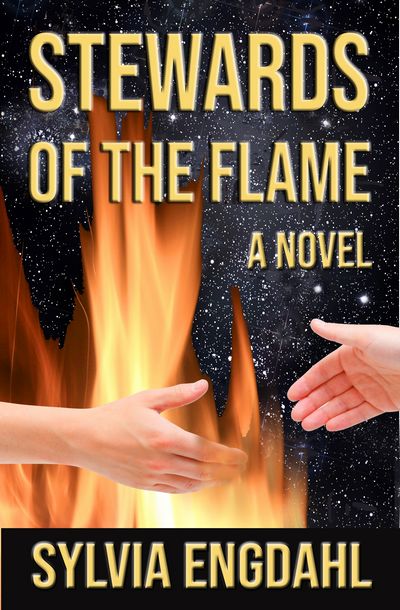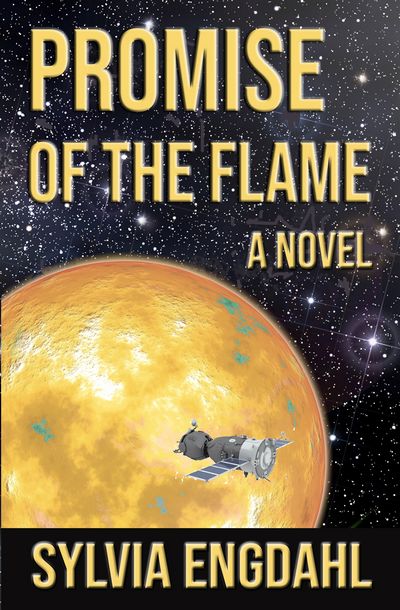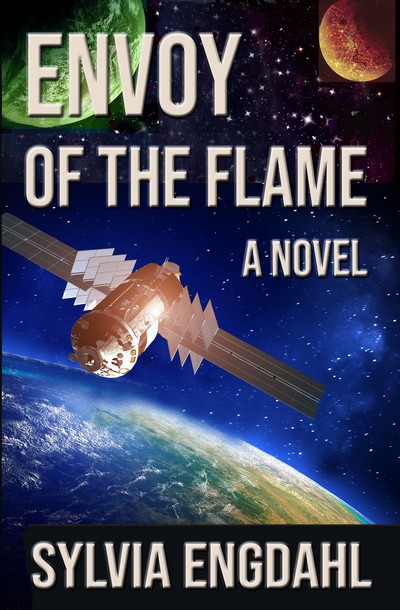
Why My Adult Novels
Aren't Suitable for Kids
by Sylvia Engdahl
Many adult readers of my Young Adult novels are unaware that I have written five novels for adults, since these are print-on-demand books that are in few if any libraries and are most accessible in their much-less-expensive ebook editions. They include the Founders of Maclairn duology (Stewards of the Flame and Promise of the Flame) and the Captain of Estel trilogy (Defender of the Flame, Herald of the Flame, and Envoy of the Flame). They are science fiction dealing with many of the same themes as my YA novels and are in some ways closely tied, so it might be thought that they could be given to advanced readers among kids who like my others. This essay explains why they shouldnít be.*
Because Iím known as a Young Adult author, I realized when I published my first adult novel Stewards of the Flame that some people might erroneously assume that it was suitable for teens. After all, YA books are more mature than they used to be. I've been saying for years that Beyond the Tomorrow Mountains and The Doors of the Universeóand for that matter, The Far Side of Evilóarenít of interest to as young children as are often encouraged to read therm; most kids below high school age are confused or bored by them, and the omnibus Children of the Star was issued as adult SF. Yet parents and librarians keep suggesting them to children and very exceptional ones do enjoy them. There is nothing in them that might be considered objectionable. And so Iíve taken care to make plain in announcements that the situation with the Flame novels is different.
In the first place, it's unlikely that even high school age readers would be interested in Stewards of the Flame, as there are no young people in itóthe protagonist and all the main characters are in their forties or older. And they are concerned, among other things, with adult problems such as death in old age.† Older teens who read other adult science fiction might like the four later books, especially Defender of the Flame, whose hero is in his twenties at its beginning; and if they want to read them, thatís all right. But I canít say so in publicity, because my experience has been that if I tell people that a book is appropriate for older teens, they will offer it to middle-school kids anyway. And I do not believe these novels should be given to children of that age, however advanced their reading ability.
For one thing, they contain some sex and profanity, mild by the standards of adult fiction but more than is expected from me on the basis of my YA novels. One adult reader told me he was surprised to find sex in Stewards, and then realized he shouldnít have been; but this confirms my suspicion that others, including librarians, might assume that anything by the author of Enchantress from the Stars will be okay for all ages. The sex scenes in the Flame novels are brief and not very explicit; the issue isnít so much that some parents might object to them as that kids might be misled by the view of sex they express. I feel that the discussions in all five books about how, in my imagined future, sex enhances telepathic sensitivity and vice versa would confuse those too young to know much about the reality of ordinary sex today. I believe that unconscious telepathy does indeed enhance it and that this makes the difference between real love and a mere union of bodies, but I certainly wouldn't want to encourage teens to experiment.

Incidentally, Iíve found that I need to be careful about calling these books ďadult novelsĒ in contexts not clearly comparing them with YA novels. Some software has rejected my descriptions because it interpreted ďadultĒ as ďX-rated.Ē (This why in some places you may see them called ďnovels for grown-ups.Ē) And Iíve wondered if perhaps some of the many adult admirers of my YA novels who havenít read any of my others misinterpreted their descriptions in the same way. If so, rest assured that thereís nothing in them that an adult would find too graphic.
A further issue with sex in Promise of the Flame is that it advocates sex among thirteen-year-olds, albeit in a society where population increase is vital to a colonyís survival and the children are emotionally more mature than in ours because of their telepathic sensitivity and the nature of their rearing.† Moreover, the plot resolution hinges on the pregnancy of a fourteen-year-old girl. There is also an incident involving the unavoidable execution of a thirteen-year-old boy who raped and killed a younger child. I have seen reviews stating that this book should not have been issued as YA, when I have done everything within my power to publicize the fact that it was not. I have contacted two libraries among the very few that have it, telling them to take it out of the YA collection where their catalogs said it was shelved. What more can I do?The final and perhaps most significant reason I feel Stewards of the Flame is unsuitable for children is that itís strongly critical of today's medical dogma and advocates ignoring government health advice, including much that is taught in todayís schools. And it presents medical care as unpleasant and even frightening. To be sure, it deals with a future society, and I hope makes plain to adults that today it would not be possible to reject orthodox medical care to the extent the characters do, since we lack the means to implement their alternative. But young readers might not make the distinction. To them the story would say ďAvoid doctors, if necessary by hiding your symptoms.Ē And a lot of parents and schools would object if they thought a noted YA author was trying to undermine the official view on this subject in the minds of kids. I donít want to damage my reputation in the YA field by upsetting parents or teachers, and I donít want to mislead kids by presenting them with material that they havenít the maturity to interpret.
There are no issues in Defender of the Flame and Herald of the Flame other than their portrayal of the relation between sex and telepathy. If high school age teens want to read them, thatís fineóbut I think itís important to make clear that librarians shouldnít order even these two for the YA collection. Also, if I didnít emphasize that they are not YA novels, people whoíve seen my name mentioned as a Young Adult author might erroneously assume that they are for teens and therefore not of interest to adults.

In the third book of the trilogy, Envoy of the Flame, interspecies marriage (between a woman from Earth and a man whose ancestors evolved on a different world) plays a significant role, and I have found to my surprise that this idea is disturbing even to some adults, despite the growing genre of "science fiction romance" featuring love between humans and aliens. Yet Mr. Spock in Star Trek has been accepted for decades and children know that he is a cross between a human and a Vulcan. (Although in reality a union between partners with separately-evolved DNA would not produce offspring.) As far as that goes, my own YA novels are based on love between people of different worlds, though only in the case of Noren and Lianne, neither of whom is of our own species, is any sex involved. Apparently all these precedents are viewed as mere fantasy that raises no real issues, whereas Envoy takes the possibility seriously, That alone is not, in my opinion, in any way objectionable; but there is an incident dealing with medical proof of a sexual relationship that makes the book inappropriate for younger teens.
The difficulty that arises when
writing for separate audiences is a common problem for authors; some even write
under different pen names for readers of different genres, often because
publishers demand it for marketing reasons. In some ways I wish I had done
that.† Yet many well-known authors have written both adult novels and
childrenís books under their own names. Perhaps theirs were more clearly
distinguishable from each other than mineómine are not really ďchildrenís
books,Ē after all, despite having been issued by that department of their
original publishers. Even Enchantress from the Stars was intended for
teens, and happy though I am that it became a Newbery Honor Book, itís
frustrating to have it given so often to kids as young as the fifth grade, who
are not old enough to understand much of what itís about. The others are
enjoyed mainly by high school age readers and adults, who naturally think
whatever else I write is going to be comparable. So I do see a need to clarify
the reasons why theyíre not.
Copyright 2017, 2022 by Sylvia Engdahl
All rights reserved.
This essay is included in my ebook Reflections on Enchantress from the Stars and Other Essays